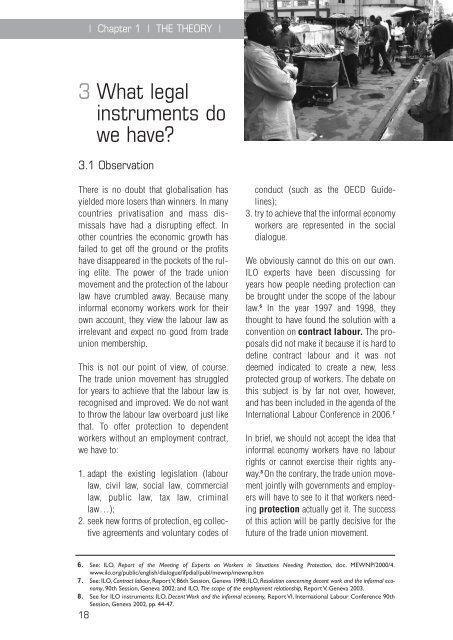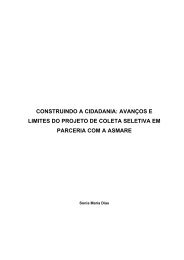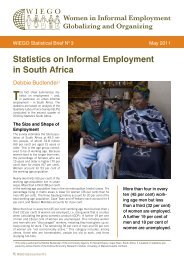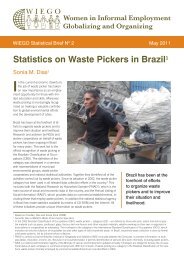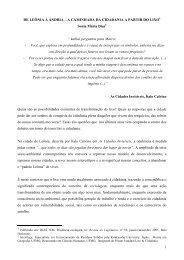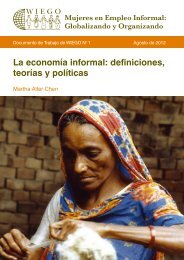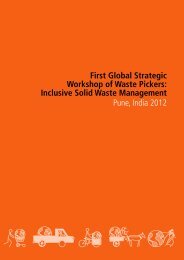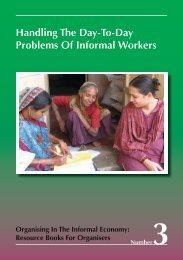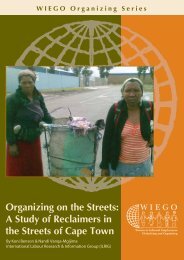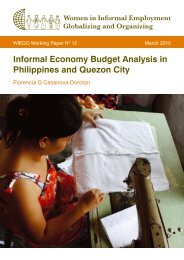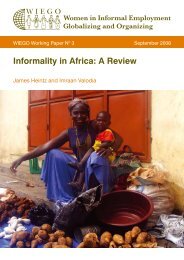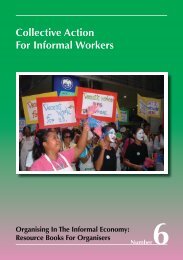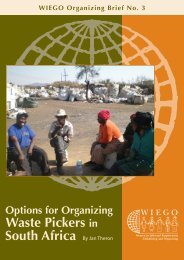Ten Trade Union Actions - Inclusive Cities
Ten Trade Union Actions - Inclusive Cities
Ten Trade Union Actions - Inclusive Cities
Create successful ePaper yourself
Turn your PDF publications into a flip-book with our unique Google optimized e-Paper software.
| Chapter 1 | THE THEORY |3 What legalinstruments dowe have?3.1 ObservationThere is no doubt that globalisation hasyielded more losers than winners. In manycountries privatisation and mass dismissalshave had a disrupting effect. Inother countries the economic growth hasfailed to get off the ground or the profitshave disappeared in the pockets of the rulingelite. The power of the trade unionmovement and the protection of the labourlaw have crumbled away. Because manyinformal economy workers work for theirown account, they view the labour law asirrelevant and expect no good from tradeunion membership.This is not our point of view, of course.The trade union movement has struggledfor years to achieve that the labour law isrecognised and improved. We do not wantto throw the labour law overboard just likethat. To offer protection to dependentworkers without an employment contract,we have to:1. adapt the existing legislation (labourlaw, civil law, social law, commerciallaw, public law, tax law, criminallaw…);2. seek new forms of protection, eg collectiveagreements and voluntary codes ofconduct (such as the OECD Guidelines);3. try to achieve that the informal economyworkers are represented in the socialdialogue.We obviously cannot do this on our own.ILO experts have been discussing foryears how people needing protection canbe brought under the scope of the labourlaw. 6 In the year 1997 and 1998, theythought to have found the solution with aconvention on contract labour. The proposalsdid not make it because it is hard todefine contract labour and it was notdeemed indicated to create a new, lessprotected group of workers. The debate onthis subject is by far not over, however,and has been included in the agenda of theInternational Labour Conference in 2006. 7In brief, we should not accept the idea thatinformal economy workers have no labourrights or cannot exercise their rights anyway.8 On the contrary, the trade union movementjointly with governments and employerswill have to see to it that workers needingprotection actually get it. The successof this action will be partly decisive for thefuture of the trade union movement.6. See: ILO, Report of the Meeting of Experts on Workers in Situations Needing Protection, doc. MEWNP/2000/4.www.ilo.org/public/english/dialogue/ifpdial/publ/mewnp/mewnp.htm7. See: ILO, Contract labour, Report V, 86th Session, Geneva 1998; ILO, Resolution concerning decent work and the informal economy,90th Session, Geneva 2002; and ILO, The scope of the employment relationship, Report V, Geneva 2003.8. See for ILO instruments: ILO, Decent Work and the informal economy, Report VI, International Labour Conference 90thSession, Geneva 2002, pp. 44-47.18


